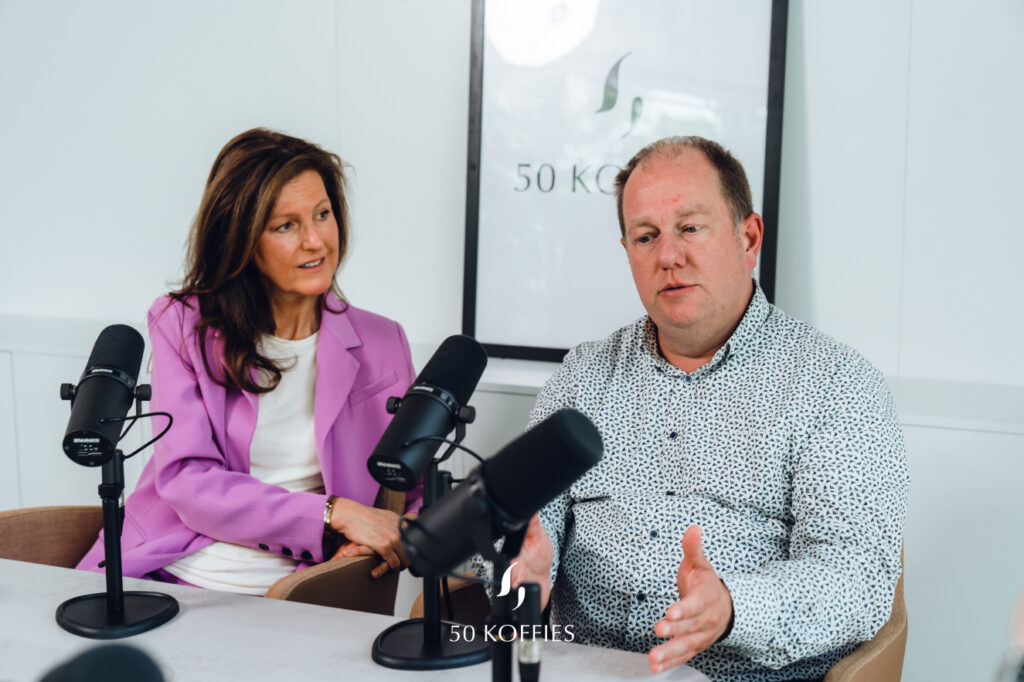- BLOG, DIGITAL TRANSFORMATION
Automation, cross-functional teams and people-centred leadership: an in-depth conversation
10 MIN LEZEN

In the latest episode of the podcast “50 Coffees”, we take a look into the world of modern business. Hans Smellinckx, the energetic CEO and co-founder of Markies, talks to Nathalie Liefsoens, the dynamic CEO of A Priori. Together, they talk about three game-changers in today’s business world: the automation of business processes, the power of cross-functional teams and the importance of people-centred leadership.
We all know that digitalisation is a hot topic in the business world. Yet we see that a large number of Belgian companies have not yet fully embraced this trend. And that while there are so many opportunities to be seized. What can companies do to optimise themselves? The answers lie in these three key areas.
Automation of business processes
Automation has become the driver of efficient business operations. This emerging trend is driven by the need for speed, precision and scalability in business processes. It revolves around using advanced technologies such as AI, machine learning and workflow automation to streamline repetitive tasks to save valuable time and resources.
Hans stresses that it is no longer a choice, but an absolute must to fine-tune your business processes using cutting-edge technologies. By doing so, organisations can not only save costs, but also take the quality and speed of their services to the next level. This translates into a competitive advantage in a world where speed and efficiency are essential.
With smart automation techniques in the mix, companies can get a big head start in the modern business world. They use data-driven decision-making and personalised experiences for customers. Implementing these techniques requires a deep understanding of business processes, technologies and the specific needs of the organisation.
People-centred leadership is the glue that holds an organisation together.

The Importance of cross-functional teams
Having cross-functional teams is essential. By bringing together different expertise and perspectives, you obtain innovative solutions and increase creativity within your company.
Cross-functional teams also break down traditional departmental boundaries. This means that marketing, sales, development and other departments no longer operate as islands. Instead, they work together as a well-oiled machine. This allows them to collaborate on complex projects and tackle difficult challenges with a combined strength that extends beyond individual departments. The strength of cross-functional teams comes from the diversity of talents and perspectives they bring together. This not only increases productivity and efficiency, but also fosters a culture of continuous growth and learning. It is a proven method for thriving in the dynamic world of modern business.

People-centred leadership as a driving force
People-centred leadership is the glue that holds an organisation together. In practice, we often see leaders taking their focus elsewhere and ignoring the essentials: their people. This is a missed opportunity, because a leader who invests in the well-being, growth and engagement of his team creates an environment where positivity and productivity flourish. And the beauty is, this translates directly into higher team engagement, satisfaction and top performance.
When leadership is not aligned with the needs of the team, it can be the weakest link in the optimisation process. Implementing technological innovations may seem relatively easy, but actually embracing and guiding employees requires a lot more finesse. Too often the focus is too much on tasks and projects, and changes are simply imposed on staff. Let’s face it, change always brings with it a degree of anxiety. This is completely human, but this is precisely why it is vital to include employees in this process from the very beginning.
It goes without saying that a business leader must have the right ‘people skills’. To build support, it pays to ask yourself a few questions as a business leader: ‘Are the right people in the right place?’ and ‘How can we equip our team with new skills?’ A smart move is to appoint a ‘people manager’ for each optimisation project. This person can fully focus on this process and is ready to solve questions and problems. This way, you take an important step towards a smooth and successful optimisation process!
Conclusion
In short, this episode offers a wealth of insights and inspiration for both emerging entrepreneurs and established leaders. The combination of automation, cross-functional teams and people-centred leadership proves to be a powerful formula for successfully leading a modern organisation. It is important to realise that optimising a business is a continuous process. As a company, you have to keep evolving, improving and learning.
For more in-depth discussions and inspiration, listen to the full episode at 50 Koffies Original.


